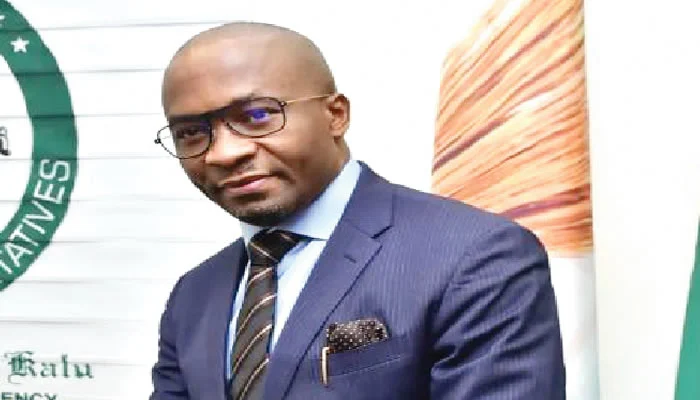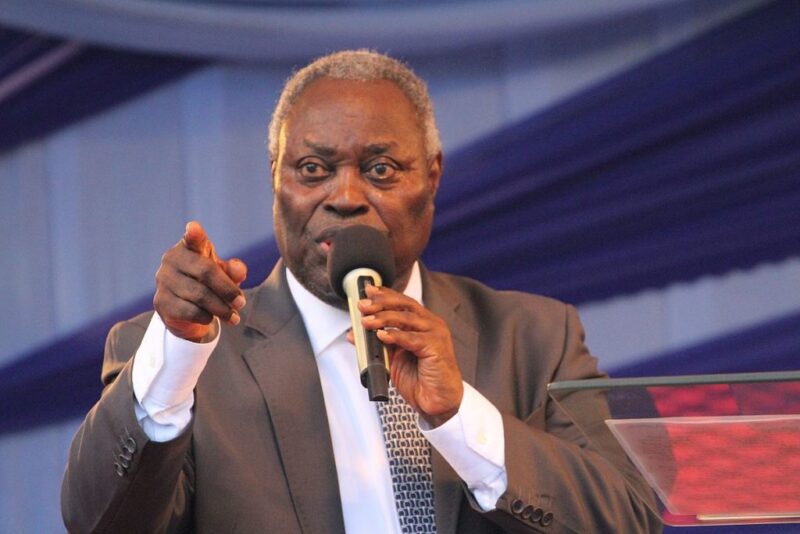Breaking News
JUST IN: 2023 elections will scuttle impeachment threat – Reps’ spokesman, Kalu
Nigerians should know that nobody is fighting that this bill must be passed at all cost. That was why, when the fake news was distributed around the country that the northern bloc of the parliament had a secret meeting where they decided to impeach the Speaker if this bill did not pass through.

In this interview with LEKE BAIYEWU, the Chairman of the Committee on Media and Public Affairs in the House of Representatives, Benjamin Kalu, talks about the impeachment move against the President, Major General Muhammadu Buhari (retd.), and the controversial water bill
The National Assembly is now on a two-month annual recess, but the security committee members said they had been asked to stay back to continue engagements with the agencies. Does this mean the security crisis is worse than Nigerians think?
As you know, we have always proceeded on our annual recess around this time of the year. This is not the first time that we have had a perilous time.
Not too long ago, there was the issue of COVID-19, and we hardly enjoyed our recess because we were always on standby to attend to matters of urgent public importance.
On the basis of that, the relevant committees were duly asked to stand by so that if there are decisions that should be taken or pressure that should be mounted on the Executive (arm of the government) to make them act as expected for the security of lives and property, it will not be a far-fetched call to try to reach out to our members.
So, members are sacrificing their comfort and all that they are expected to enjoy during this recess to stand around and watch how the security of the country goes.
Beyond the members of the security committees, there are still some of us who are part of the leadership who are standing by to ensure that the narratives are rightly done and that Nigerians are not filled with the fear that it has escalated in the media, beyond what is on the ground, as well as to justify their fears and, where the need arises, to make sure that those fears are taken care of, using the security instruments and architecture of the country.
So, yes, you are right to say that most of us are around watching the situation to make sure that Nigeria is safer. And to say that it is an indication that insecurity is at a high stage at the moment will not be a wrong analysis. It has never been this bad. That is the truth.
The insurgency and terrorism used to be in the forests, but now it appears they are moving to the streets of the country. It ought not to be so. I am sure that the security agencies have also fine tuned their strategies to make sure that the lives and property of Nigerians are better secured than before. A new strategy is in place, as we have been briefed, to make sure that the terrorists don’t take over our streets.
It is over this security matter that the opposition members of the Senate and the House have threatened the President with impeachment after a six-week ultimatum. Is the reason for the move justifiable if you have admitted that the country has not had it this bad?
The issue of impeachment is a topic that needs to be handled carefully because it is a serious matter that is not as simple as the word sounds. You are talking about sacking the number one citizen of the country. We are talking about reversing the mandate of the majority of the citizens who voted for him to be president.
You are aware that in the most recent election, he received 55.6% of all votes cast. We are talking about Mr. President, who garnered about 15.2 million votes, as opposed to Vice-President Atiku (Abubakar, candidate of the Peoples Democratic Party), who got about 11.3 million votes. We are talking about an election that recorded about 35.6% (34.75% actually) turnout. It is an election where the sitting President won 19 states, including the two most populous states, Lagos and Kano. Atiku won about 17 states. We are talking about a president that won a quarter of the votes cast in two-thirds of the (36) states, in addition to the overall majority. We are talking about an election where Nigeria spent about $6.24 on each voter that voted in that election. At that time, it was about N2,249 per voter. If you look at the current rate at the moment; we are talking about when a dollar is N710 (on the black market). That is N4,430 per person.
In 2018, the National Assembly was approached by the Independent National Electoral Commission to approve the sum of N189bn for the 2019 general elections. So, when you talk about impeachment, these are the kinds of things that those who are calling for it are supposed to put into perspective, to know whether it is actually the best way forward.
As you know, you cannot do this analysis without actually looking at the procedural timelines as outlined by Section 143 of the Constitution. When the people called for impeachment, which they said would start in two months’ time, the question should be, “We are in August. How many months more does this particular administration have before winding down? “We are talking about nine months, if you calculate from September to May. You said you were giving Mr. President six weeks to allow Mr. President to fix things, and if not, you would call for impeachment. If you are going to take two months out of the nine months, what is left is seven months.
You need about one-third of the National Assembly members to agree that a notice should be presented to the President of the Senate alleging misconduct by Mr. President. It will take a lot of time to get one-third of the National Assembly members, especially considering this season of elections and campaigns. Once a notice is given to the President of the Senate, he needs another seven days to serve Mr. President and every member of the National Assembly. Add those seven days to the 14 days that the President of the Senate is supposed to present Mr. President’s response to the National Assembly, for them to adopt a motion without a debate on whether or not the investigation should go on. These are in line with Section 143 (of the 1999 Constitution).
After those 14 days, there are another seven days that the Senate President needs, if the motion survives, for him to contact the Chief Justice of the Federation, for the CJN to appoint a panel of seven members who are seen to be unbiased. This seven-man panel will take about three months to submit their report. If the panel presents their report after three months, you only have three months left. And the three months that are left, in line with the Constitution, are the three months that lead to the elections. If they submit their report within three months, you need another two-thirds of the entire members of the National Assembly (240 in the House and 73 in the Senate) to be ready to accept the report of the panel.
We are talking about raising the two-thirds in a period when people are busy with electioneering, and I don’t see that happening in one month or two months. So, the three months that are left will take us to February of next year when we have the general elections.
So, do you expect that the members of the National Assembly would be adopting the report of a panel in the month they are seeking election or voting for a new president? That will be leaving something that is important to pay attention to and something that can be ignored entirely because the PDP, APC, and APGA, the minority and the majority, will not be able to sit in the House to constitute the two-thirds that is needed in the month of elections.
This is why I am saying that the call from the minority for the impeachment of Mr. President is coming at a very wrong time. It may never be achievable based on the procedural timeline allowed by Section 143 of the Constitution. Maybe if they had made this call earlier than they did now, the timelines prescribed by Section 143 might actually have given them the breathing space to achieve that.
I can assure you that it will be difficult to push this through and it might end up as wishful thinking because we don’t have enough time to carry it out.
There are fears about the controversial water bill, especially with the allegation that it is a northern agenda. Can you assure Nigerians that it will go through the due process and that the lawmakers’ popular vote will count on the legislation?
This issue of the northern agenda, the southern agenda, Muslims’ agenda or Christians’ agenda is a divisive approach to national issues. It is very divisive.
What if the Chairman of the Committee on Water Resources (Sada Soli) is not a northerner? Would this bill be seen in the way and the colouration that it is seen?
What if the Minister of Water Resources (Suleiman Adamu) is not a northerner? Would this bill be seen as it is? What if the President of the country is not a northerner? Would this bill be seen in the colours that it has been described in?
This bill has come up and down the parliament for several years, and when it came up this time, the Speaker (Femi Gbajabiamila) insisted that the members of parliament should be allowed access to the details of this bill for proper analysis to guide their debate—for proper consultations with the stakeholders in their various communities and constituencies, for proper context when they are coming to plenary to debate it.
The men who presented this bill on behalf of the Executive – it is important that I mention that this bill is not owned by Honourable Sada Soli, Chairman, House Committee on Water Resources; this bill is owned by the Executive and he is not doing anything outside the books to make sure that at all cost, this bill must go through.
Nigerians should know that nobody is fighting that this bill must be passed at all cost. That was why, when the fake news was distributed around the country that the northern bloc of the parliament had a secret meeting where they decided to impeach the Speaker if this bill did not pass through. That was wrong, and we took steps for the people mentioned in that fake news to speak up. It is not a do-or-die affair. The National Water Resources Bill is not before the parliament in a do-or-die atmosphere.



















